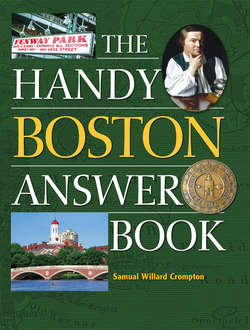Читать книгу The Handy Boston Answer Book - Samuel Willard Crompton - Страница 26
На сайте Литреса книга снята с продажи.
AN AFRICAN AMERICAN VOICE
ОглавлениеHow did Phillis Wheatley become so well-known in pre-Revolutionary Boston?
Born in Senegal, Phillis Wheatley (1753–1784) was captured, enslaved, and brought to Boston around the year 1762. The name of the ship that brought her was Phillis, and the name of the family that purchased her was Wheatley. Her story was unremarkable to this point; many African Americans came to Boston as slaves. Something different emerged during her first decade in America, however: Phillis Wheatley had the same level of education as a typical upper-class white girl of her time.
John and Susannah Wheatley were very fond of their slave girl, and they raised her up to be something of a prodigy. There may have been some black poets prior to Phillis, but none of them are known. Phillis, by contrast, became known as early as 1770, when she wrote an elegy in honor of Reverend George Whitefield. As she entered her twenties, Phillis extended her literary skills even further, and her first selection of poems were published first in London, and then in Boston (in 1773 and 1774).
Was Phillis Wheatley as talented as her many admirers like to claim?
Her poetry has, over the last two centuries, been both acclaimed and despised. Many literary scholars characterize her something of a copycat, declaring that almost any well-educated girl of the time could have turned out those lines. What these scholars ignore is the depth of feeling that emerges from Phillis’s poems. Here was a person who saw almost the worst life had to offer, and through the kindness of her mistress, as well as her own considerable great efforts, she rose above the situation.
Phillis Wheatley and her mistress returned to Boston from London in 1774. Susannah Wheatley died soon thereafter, and Phillis was freed. She remained close to the Wheatley family, and, during the Siege of Boston, she became known for the poem she wrote in honor of General George Washington.
A 1773 engraving of Phillis Wheatley.
What was the life expectancy of Bostonians, and other residents of Massachusetts, during the eighteenth century?
Most of us know the large variety of illnesses and incapacities that struck almost without warning: they included smallpox, diphtheria, and tuberculosis. Occasionally the record reflects something quite different, a testimony to good health and long life. An obituary ran in the Boston Gazette on November 21, 1774.
Died at Danvers, Mr. Thomas Nelson in the 104th year of his age. He was born at Norwich in England, June 1671 in the reign of King Charles the II. At the [Glorious] Revolution he was an apprentice to a weaver in that city when he enlisted as a soldier under King William, to go over to Ireland, to drive out James II. He served also in Queen Anne’s Wars; was a sailor in the fleet under Sir Cloudesley Shovell at the siege and taking of Barcelona, and was in the expedition to Canada, 1711, at which time he settled in Danvers, and till within this year or two, was able to walk miles. He had but one eye, and his hair white like the driven snow, but retained his reason and walked remarkably erect—At length the weary wheels of life stood still.
